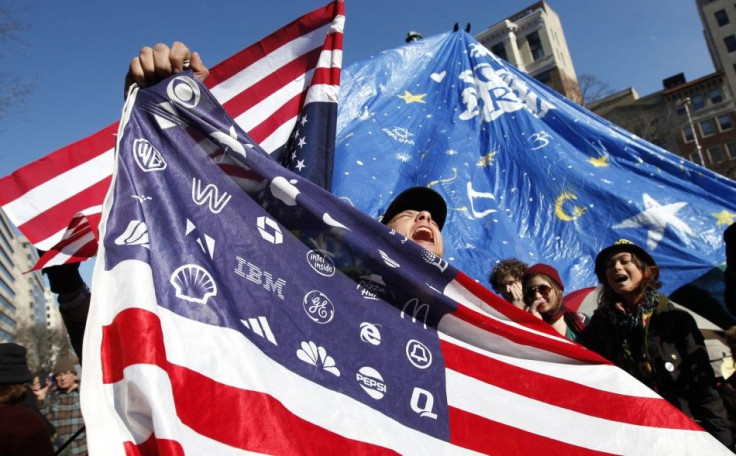Police Begin Clearing Occupy D.C. Protest Site

WASHINGTON (Reuters) - Police removed bedding and most tents on Saturday at an "Occupy" protest site just blocks from the White House, enforcing a no-camping rule at a public square that has housed protesters for months.
Dozens of officers sealed off McPherson Square and moved in before dawn to enforce the no-camping regulation. Demonstrators have been in the square since early October to target the growing income gap, corporate greed and what they see as an unfair tax structure favoring the richest Americans.
By early afternoon, officers had briefly scuffled with chanting protesters as they moved to clear the square by sections. Police said there had been six arrests and no injuries.
The National Park Service had repeatedly warned protesters that it would start enforcing a ban against camping in McPherson Square and at the Occupy movement's site at Freedom Plaza, both a few blocks from the White House.
"This is not an eviction," U.S. Park Police Sergeant David Schlosser told reporters. "We're not just willy-nilly tossing stuff."
He called the action a "nuisance abatement" and said police were "focusing on camping restrictions."
Guarded by police, sanitation workers cleared away most tents and heaps of bedding, palettes, crates, tarpaulins, full-sized mattresses, books, clothes, straw and other debris that had accumulated over the four months of occupation.
Although many demonstrators were packing up tents and belongings, others vowed to sleep on the sidewalk or seek shelter at churches and elsewhere.
"The most important thing is to maintain our presence. That is the plan," said Edward Sahadi, 47, a baker from Key West, Florida, who has been at the site for more than three months.
The Occupy movement began when protesters set up camp in New York's Zuccotti Park on Sept. 17, sparking demonstrations across the United States and elsewhere in the world, and its message of economic equality has become a theme in the U.S. presidential race.
But the eviction of Occupy Wall Street protesters and public spaces in other U.S. cities in November and December has made the protests less visible and organizers now face the challenge of how to maintain momentum without the physical camps.
Local media in Austin, Texas, reported that police had cleared an Occupy encampment there, with seven arrests. A spokesman for the Austin Police Department was not immediately available to comment.
Demonstrations in the U.S. capital have survived an unusually warm winter and a permissive approach by federal authorities reluctant to provoke confrontation.
But McPherson Square, which borders Washington's K Street lobbying corridor, had drawn increasing complaints from members of Congress and city officials because of the rising costs of policing, squalor and rats. The protest site also had drawn numbers of homeless people.
Despite their small numbers, the Washington protesters have received outsized media attention because their camps are near the White House.
The National Park Service forbids camping on federal land not designated as a campground. Park rules allow tents or temporary structures as part of protests but they cannot have bedding, and a tent flap or side of the structure must be open.
There was no sign of police activity at the second protest site, Freedom Plaza. Schlosser said: "We'll address Freedom Plaza at a later time."
Jeffrey Light, an attorney advising the Occupy protesters, said police had been removing tents that were in compliance with regulation.
The clearing operation "is what has happened in so many other cities and it's going to happen here," he said.
(Additional reporting by Will Dunham; Editing by Vicki Allen and Jackie Frank)
© Copyright Thomson Reuters 2024. All rights reserved.






















